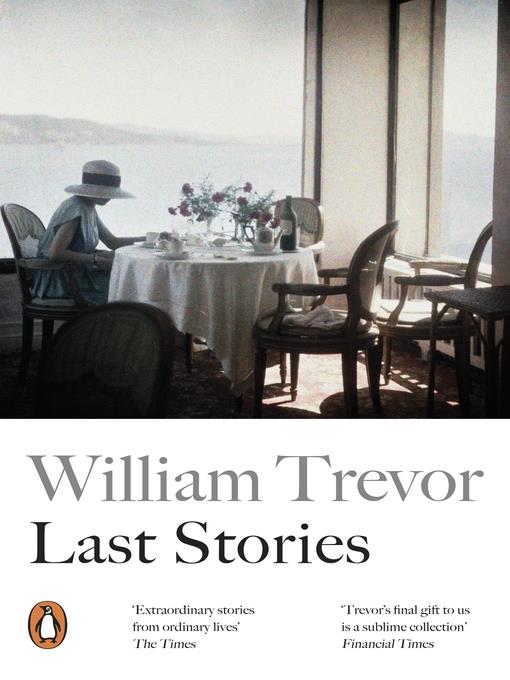
Last Stories
کتاب های مرتبط
- اطلاعات
- نقد و بررسی
- دیدگاه کاربران
نقد و بررسی

Starred review from March 19, 2018
This spare collection of 10 stories by the late Trevor (The Story of Lucy Gault) might be too bleak if its darkness weren’t skillfully counterbalanced by sly hints of humor and understated compassion. The stories are sharp and concise, containing whole lives in the span of just a few pages. The book as a whole has an elegiac tone, with death figuring heavily in many of the stories. Often, it’s death observed at a distance, as in “The Crippled Man,” in which two foreign painters speculate about the disappearance of one of the owners of the house they are painting, or “The Unknown Girl,” in which the former employer of a young woman killed crossing the street wonders whether she holds partial responsibility. Many of Trevor’s stories contemplate two interacting characters who have little in common, like the prostitute who pursues a picture-restorer whose memory is failing in “Giotto’s Angels,” or the very different widow and widower in “Mrs Crasthorpe.” The author keeps a distance from his characters, driven to incomprehensible actions by motives even they don’t understand. Readers familiar with Trevor, who died in 2016, will find satisfying closure, and those new to his work will find reason to go back and explore his previous books.

December 1, 2017
Publishing on May 24, which would have been Trevor's 90th birthday, this collection of ten final stories from a multi-award-winning master of the form will draw big attention throughout the literary community. Six of the ten stories have not appeared in print, though they will be surfacing in The New Yorker, and the remaining four stories have never appeared between book covers.
Copyright 2017 Library Journal, LLC Used with permission.

Starred review from March 1, 2018
Two workmen realize that the worn-out relative/housekeeper of the crippled man who hired them is hiding his boss's death (the better to keep receiving his pension). A man learns that the rumpled woman found dead in an alley was once the polished, desperately striving widow who tried to win him. A cartographer returns to the Yorkshire farm where he once tutored a lovely girl, now a grown woman with whom he falls in love. Throughout these final stories from the masterly Trevor (The Story of Lucy Gault), limpid and clearly defined as dewdrops on a branch, we see characters dealing with the past and moving forward--or not. Not surprisingly, there's an autumnal air throughout: the housekeeper "had once known what she wanted, but she wasn't so sure about that anymore," while the cartographer realizes that you can't escape what's done ("the damaged do not politely go away"), and a woman betrayed by a friend recalls a time when "friendship was the better thing." Yet this is hard-won wisdom, not sorrow. VERDICT Highly recommended. [See Prepub Alert, 11/6/17.]
Copyright 2018 Library Journal, LLC Used with permission.

Starred review from March 1, 2018
Ten short fictions from the late Irish master (1928-2016) explore love, betrayal, and the ways that people cope with life's blows.There's a distinct shortage of happiness in this book, not least because it's a reminder that Trevor (Selected Stories, 2010, etc.) is no longer writing. The stories themselves make up a grim group, dealing in theft, extortion, and infidelity. In the opener, "The Piano Teacher's Pupil," a boy's musical talent comes with a light-fingered larceny. The teacher exemplifies Trevor's uncanny skill in compression, defining the milestones of her life by one room and three sentences, noting how memory can ease pain: "If a beloved lover had belittled love it mattered less in that same soothing retrospect." Theft arises again when a prostitute steals the savings of a man suffering from a memory disorder ("Giotto's Angels"). "The Crippled Man" ends with a woman concealing her handicapped cousin's death to keep his pension coming. Trevor paints the cousins' lives in rich, sharp strokes while working in the marginal existence of two itinerant Carinthian house painters and the way a woman's tough economies might benefit from a carnal arrangement with a butcher. In "At the Caff' Daria," two women, once friends, meet years later after the death of the man who married one and then left her for the other. Another fickle male lover appears in "An Idyll in Winter," barely touched by the pain he cavalierly inflicts on his wife and a former pupil. "Mrs Crasthorpe" is a widowed woman whose name partly defines her as crass, but while she dies in alcoholic squalor, sympathy is stirred by her trials with a son who is a recidivist flasher.As always, Trevor navigates the rough seas of human relations with a new angle, fresh language, deep sympathy, and uncanny insight.
COPYRIGHT(2018) Kirkus Reviews, ALL RIGHTS RESERVED.

























دیدگاه کاربران